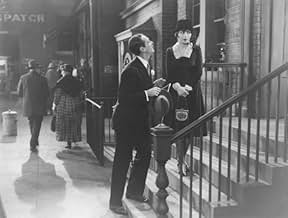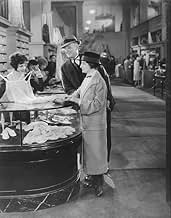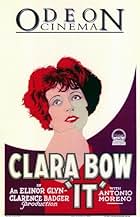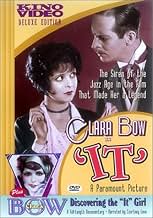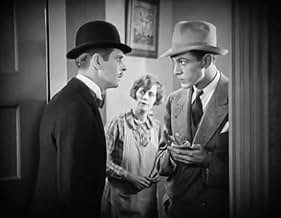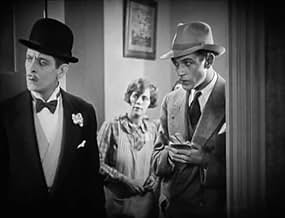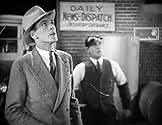AVALIAÇÃO DA IMDb
7,2/10
3,8 mil
SUA AVALIAÇÃO
Adicionar um enredo no seu idiomaA salesgirl pursues a handsome playboy.A salesgirl pursues a handsome playboy.A salesgirl pursues a handsome playboy.
- Direção
- Roteiristas
- Artistas
- Prêmios
- 1 vitória no total
Elinor Glyn
- Madame Elinor Glyn
- (as Madame Elinor Glyn)
Elmo Billings
- Office Boy
- (não creditado)
Gary Cooper
- Newspaper Reporter
- (não creditado)
Lloyd Corrigan
- Yacht Cabin Boy
- (não creditado)
Cheryl Holt
- Baby
- (não creditado)
Eleanor Lawson
- First Welfare Worker
- (não creditado)
Rose Tapley
- Second Welfare Worker
- (não creditado)
Dorothy Tree
- Waltham Employee
- (não creditado)
Avaliações em destaque
Two years after "It" came out the silent picture would be a thing of the past. Still, the most striking thing about this movie, after the always beautiful Clara Bow, is how modern it looks. On the Kino DVD the picture is sharp and clear, with excellent contrast. It looks as good as black and white can.
The story itself is fluff. The It of the title, which translates roughly as sex appeal, is irrelevant to the plot. Salesgirl Betty Lou Spence (Bow) falls in love with owner of big department store Cyrus Waltham, Jr. (Antonio Moreno). She chases him, he chases her, misunderstanding separates them. Even though the plot is light, it fulfills its modest goals well, largely due to Bow's energy. William Austin, as Moreno's friend Monty, is also a high point. In one key scene he also shows himself to be a far more caring and sensitive person than Cyrus, and probably a better choice for Betty's affections. Sadly, that's not how this kind of movie works.
The camera work is pretty sophisticated for the time. The scenes of Betty and Cyrus's date at the beach, with quick cuts as the two laugh, play and fall in love, are now a cliche, although one that's still used. The use of panning, different angles during scenes and plenty of close-ups keep the movie moving, without the long shots before a stationary camera that characterized many indoor scenes during the silent era. Were it not for the lack of sound and the title cards, one could easily think this movie was made as late as the start of WWII.
"It" is not an important movie in the development of cinema, either in terms of technique or theme. Instead, it's an entertaining romantic comedy, largely due to Bow's electrifying screen presence and Austin's satisfying performance. Clara Bow was a huge star, who defined the female sex symbol during the 20s. Even today it's hard to imagine anyone watching her and being able to deny that she does indeed have It.
The story itself is fluff. The It of the title, which translates roughly as sex appeal, is irrelevant to the plot. Salesgirl Betty Lou Spence (Bow) falls in love with owner of big department store Cyrus Waltham, Jr. (Antonio Moreno). She chases him, he chases her, misunderstanding separates them. Even though the plot is light, it fulfills its modest goals well, largely due to Bow's energy. William Austin, as Moreno's friend Monty, is also a high point. In one key scene he also shows himself to be a far more caring and sensitive person than Cyrus, and probably a better choice for Betty's affections. Sadly, that's not how this kind of movie works.
The camera work is pretty sophisticated for the time. The scenes of Betty and Cyrus's date at the beach, with quick cuts as the two laugh, play and fall in love, are now a cliche, although one that's still used. The use of panning, different angles during scenes and plenty of close-ups keep the movie moving, without the long shots before a stationary camera that characterized many indoor scenes during the silent era. Were it not for the lack of sound and the title cards, one could easily think this movie was made as late as the start of WWII.
"It" is not an important movie in the development of cinema, either in terms of technique or theme. Instead, it's an entertaining romantic comedy, largely due to Bow's electrifying screen presence and Austin's satisfying performance. Clara Bow was a huge star, who defined the female sex symbol during the 20s. Even today it's hard to imagine anyone watching her and being able to deny that she does indeed have It.
Nothing earth shattering here, no high art, just pure entertainment! A bit like today's light romantic comedies, but a tad better in a lot of instances! The real star here is Clara Bow who could after all really act and wasn't just another pretty face, although she was that and more! It's not difficult to see why she became a popular personality with her vivacity, energy and contagious charm! The girl just exuded fun! As Antonio Moreno said in the movie, "She has plenty in reserve!" There are some cute lines in the movie, like when Monty says, " I feel so low I'd have to walk on stilts under a dachshund." William Austin is an entertaining secondary character.
The print I saw was in good shape and I enjoyed the high angle shots of the department store at the beginning of the movie with the camera panning down to the street, the amusement park scenes and the scenes on the yacht. Makes me want to see Clara in a serious drama too! Worth watching for Clara to see what It was all about! I don't think It has changed that much even in the present day!
The print I saw was in good shape and I enjoyed the high angle shots of the department store at the beginning of the movie with the camera panning down to the street, the amusement park scenes and the scenes on the yacht. Makes me want to see Clara in a serious drama too! Worth watching for Clara to see what It was all about! I don't think It has changed that much even in the present day!
I'm completely smitten with Clara Bow. After having seen Wings, and having just watched It and the TCM documentary Clara Bow: Discovering the It Girl, I have to say that she's just about the most amazing actress of the silent era. Even besides her limitless beauty, it seems like she can accomplish anything with her face. It's far too bad that she was never given a role that fully suited her immense talent. Wings is the closest she ever came to making a great film, it would seem, but, even though she steals the movie away from the other actors, the dogfights and action sequences steal the movie from her. So then It has to stand as her testament, the film that best demonstrates her legacy. And because of this, it's not surprising that Bow is all but forgotten. I mean, It certainly isn't a bad movie. It's a moderately well done romantic comedy where the shopgirl goes after her rich boss. It's fun and entertaining, but not necessarily something you'll remember for that long afterwords. Much like any romantic comedy that would be released today, among which the best is only an average movie. But then those looking to observe Clara Bow's talent don't exactly need another movie. Bow effortlessly raises the level of the project. It would have been rather average without her, but she makes it good. Quite good, in fact. I couldn't take my eyes off her, and I know that I'll visit the film again because of her. The other actors are mostly forgettable, except for William Austin. He plays the boss's best friend, and he's pretty obviously a homosexual. It's one of the more open depictions I've seen. He's quite funny, as well, and it's no mean feat that he wins any attention whatsoever away from Ms. Bow. 8/10.
Cyrus (Antonio Moreno) is the heir to a large, successful department store. He falls for counter girl Betty (Clara Bow), a young woman who definitely has "IT", that indefinable quality that makes certain people the center of attention. Cyrus' goofball friend Monty (William Austin) tries to facilitate the "opposite sides of the track" romance between his buddy and Betty, with more than a few hiccups along the way. Also featuring Priscilla Bonner, Jacqueline Gadsdon, Julia Swayne Gordon, and Gary Cooper.
This was based on a story by Elinor Glyn, and if you don't know the name, you sure will by the end of the movie. Her name is featured prominently in the opening credits, then in a title card explaining what "IT" is, then in a copy of the story being read by a character in the movie, and then when Glyn shows up for a cameo, playing herself! Anyway, most people have heard of this movie and the "It Girl" moniker that it gave Clara Bow for the rest of her life..
It's a decent romantic comedy of the period, with many little period details that make modern viewing interesting. The changes in fashions, manner and speech are amusing. I don't think I'd ever seen the exclamation "Hot Socks!" before. Bow is cute, and pushes the boundary for what a woman could do, say and look like on screen (near the end of the film as she climbs soaking wet out of the water with her clothing clinging to her, leaving little to the imagination, comes to mind). In that way It prefigures the coming Pre-Code early sound era.
This was based on a story by Elinor Glyn, and if you don't know the name, you sure will by the end of the movie. Her name is featured prominently in the opening credits, then in a title card explaining what "IT" is, then in a copy of the story being read by a character in the movie, and then when Glyn shows up for a cameo, playing herself! Anyway, most people have heard of this movie and the "It Girl" moniker that it gave Clara Bow for the rest of her life..
It's a decent romantic comedy of the period, with many little period details that make modern viewing interesting. The changes in fashions, manner and speech are amusing. I don't think I'd ever seen the exclamation "Hot Socks!" before. Bow is cute, and pushes the boundary for what a woman could do, say and look like on screen (near the end of the film as she climbs soaking wet out of the water with her clothing clinging to her, leaving little to the imagination, comes to mind). In that way It prefigures the coming Pre-Code early sound era.
When it comes to IT, Clara Bow was in a league of her own. No other actress I've ever seen has even been close(maybe Jean Harlow). But most actresses since Clara didn't have silent films, which allowed her beautiful expressive eyes, facial expressions, and physical gestures (such as looking between the legs of stuffed toy dog) to do her talking and leave no doubt as to her intent. Her ability to do this made her special. I must admit that even though I loved this film, IT isn't my favorite performance by Clara. I happen to think she displayed as much and possibly more "IT" in some of her other silent movies like MANTRAP, HULA, & THE PLASTIC AGE than in IT. If you don't believe that's possible, then I highly recommend checking out some of her other films and judge for yourself. Even if you disagree, you will enjoy these performances if you enjoyed this film. As a whole, I think IT was the strongest of her silent films (in terms of plot, writing, and character development) that I've seen. Regardless, IT is the film for which Clara is most remembered and the favorite of her modern day fans. From Clara's scheming to reel in her boss as a husband to the hilarious sub-titles ("Sweet Santa, give me him", "Hot socks, the new boss", "I'll take the snap out of your garters", "He couldn't give birth to a suspicion", "On the contrary, I think she's got plenty in reserve"), I enjoyed this 1920s romantic comedy tremendously. Could Elinor Glyn, have been trying to promote her book or herself? IT was only defined 3 times during the movie (in the opening credits, in the first scene where Monty is reading about IT, and when Antonio Moreno asks Elinor Glyn herself in a scene about halfway through the film. I think if modern audiences would give IT a chance, they would be pleasantly surprised with Clara Bow. 9/10
Você sabia?
- CuriosidadesElinor Glyn gave many confusing and sometimes contradictory explanations for what "It" meant, but she always said that "It" did not mean "sex appeal" necessarily and that anyone who said it did was vulgarizing her concept. Nonetheless, "It" became a euphemism for "sex appeal," which caused that pronoun to be entered into the American lexicon as a noun in the late 1920s.
- Erros de gravaçãoAs Waltham climbs onto the anchor, his shirt sleeve is intact. The scene cuts away to Monty and Adela in the rowboat for a brief moment; however, in the next scene, Waltham's sleeve is completely torn.
- Citações
Monty Montgomery: I feel so low, old chap, that I could get on stilts and walk under a dachshund.
- ConexõesFeatured in The House That Shadows Built (1931)
Principais escolhas
Faça login para avaliar e ver a lista de recomendações personalizadas
- How long is It?Fornecido pela Alexa
Detalhes
Bilheteria
- Faturamento bruto nos EUA e Canadá
- US$ 411.891
- Tempo de duração1 hora 12 minutos
- Cor
- Mixagem de som
- Proporção
- 1.33 : 1
Contribua para esta página
Sugerir uma alteração ou adicionar conteúdo ausente

Principal brecha
By what name was O não Sei que das Mulheres (1927) officially released in India in English?
Responda
